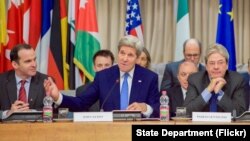If we are to be successful in our efforts to defeat and eventually eliminate violent terrorist groups, we must adopt a truly global approach in every sense of the word. This means that the community of nations must work together to address every major aspect of this scourge.
Take for example ISIL. Over the past two years, this group has managed to attract significant numbers of foreign terrorist fighters, and inspired other, like-minded violent extremist groups to align themselves with ISIL. It uses social media to spread its message, to radicalize and recruit individuals to violence. Its propaganda has also managed inspire individuals or small groups to conduct violent attacks in numerous cities around the world.
We are addressing this challenge head on, said U.S. Ambassador-at-Large and Coordinator for Counterterrorism Tina Kaidanow, but we are not doing so alone. Indeed, the United States is just one part of a coalition of 66 partners. “With nearly 10,000 air strikes, we are methodically taking their leadership off the battlefield, as well as going after their heavy weapons, oil tankers, training camps, bulk cash storage, and their infrastructure.” At the same time, in cooperation with local ground forces, “we have taken back 20 to 25 percent of the populated territory ISIL once held in Iraq and Syria, and in Iraq alone ISIL has lost 40 percent of what it held at its peak in August 2014.”
But much that needs to be done has no military solutions, said Ambassador Kaidanow. The community of nations must work together to deny terrorists reinforcements of foreign terrorist fighters. We must cut off their access to financing, disrupt and expose their messaging, and stabilize the vulnerable communities that have been liberated from ISIL control. And so, an ever increasing number of nations is closing security loopholes, identifying, arresting and even prosecuting foreign fighters heading to join ISIL. Countries are sharing information, and working together to identify triggers and prevent radicalization, recruitment, and mobilization of individuals into terrorist groups.
“The terrorism challenges we face continue to evolve at a rapid pace,” said Ambassador Kaidanow. “We need to bring strong, capable, and diverse partners to the forefront and enlist their help in the mutually important endeavor of global counterterrorism.”






